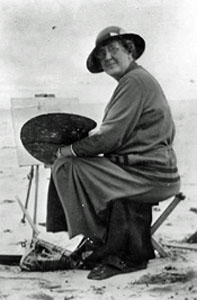Mabel May Woodward
Mabel May Woodward | |
|---|---|
 | |
| Born | September 28, 1877 |
| Died | August 14, 1945 (aged 67) |
| Resting place | Swan Point Cemetery |
| Nationality | American |
| Education | Art Students League of New York, Ogunquit Art Colony |
| Alma mater | Rhode Island School of Design |
| Years active | 1896–1943 |
| Known for | Landscape and portrait painting |
| Style | American Impressionism |
| Movement | Ashcan School[1] |
Mabel May Woodward (September 28, 1877 – August 14, 1945)[2][3][4] was a prominent Rhode Island impressionist painter during the late 19th and early 20th century.[3][5] She was active from 1896 until 1943, primarily in Rhode Island and in Maine.[6]
Early life and education
[edit]Woodward was born on September 28, 1877, to a stable, affluent family in Providence, Rhode Island,[7] where she spent most of her life, except for a brief period in San Francisco and many summers in Ogunquit, Maine.[8][9] Her family gave her the "finest domestic art education then available."[1]
She studied at the Rhode Island School of Design (RISD) in 1896,[5] and graduated with highest honors. Later in 1898, she attended the Art Students League of New York, studying under William Merritt Chase, Kenyon Cox and Frank Duveneck.[10][11][12] She also studied for a time at the Ogunquit Art Colony in Maine,[8] with Arthur Wesley Dow and Charles Woodbury.
Career
[edit]She was faculty at the Rhode Island School of Design for over twenty years.[13] There, she originated a class known as the "action class," in which students studied the human figure as a machine rather than as a stationary object.[1] She painted during her summer vacations.[14]
She was a longtime member and the first woman president of the Providence Art Club.[13]
Work
[edit]She was greatly influenced by the impressionists, particularly William Merritt Chase and Frank DuMond.[2] Woodward preferred colorful canvases and used bold, unlabored brushstrokes heavy with impasto.[12]
Her earlier work includes a series of "old-fashioned girls in gardens."[1] These were portraits of women and girls, set in outdoor gardens. Woodward's emphasis was less on the psychology of the human subject and more on the effects of light and color in the scene.[14]
Later, she became known for her summer beach scenes along the New England shore.[9] She painted many beach scenes and airy landscapes focusing on the play of light and shadow.[9] These scenes often depicted families and children enjoying fine weather at the beach.[11]
Gallery
[edit]-
Young Girl with Fish Bowl
-
Ogunquit Bathers
-
New England Summer
-
A Quiet River on a Grey Day
-
Afternoon respite
Legacy
[edit]Woodward was one of Rhode Island's best-known artists in the 1920s and 1930s.[14] But upon her death in 1945, she was almost totally unknown, as the art world favored French Impressionists over American Impressionists generally.[14] By the early 1950s, interest in her work had dwindled to the point where her family sometimes gave her paintings away.[14]
By the later part of the 20th century, interest in American Impressionists slowly returned. Woodward's work began to be rediscovered, and some of her larger portraits and beach studies have sold in the six-figure range.[14]
Her work was included in an exhibition of "neglected American impressionists" in Boston in 1972,[1] and a small retrospective exhibition at the Providence Art Club in 1992.[14]
References
[edit]- ^ a b c d e Taylor, Robert (10 October 1972). "Paintings of Mabel Woodward: Art: Providence impressionist". Boston, Mass: The Boston Globe. p. 18. ProQuest 503756294.
- ^ a b Heller, Jules; Heller, Nancy G. (2013-12-19). North American Women Artists of the Twentieth Century: A Biographical Dictionary. Routledge. p. 588. ISBN 978-1-135-63882-5.
- ^ a b Tobin, Kay (2 October 1972). "About Town, Time for Art". Newspapers.com. Fitchburg Sentinel. p. 4. Retrieved 2021-01-28.
- ^ "Woodward, Mabel May". Benezit Dictionary of Artists. Oxford University Press. 2011. doi:10.1093/benz/9780199773787.article.b00198824. ISBN 978-0-19-977378-7. Retrieved 2021-01-28.
- ^ a b Bohlin, Virginia (18 September 2005). "Capture 'Beach' Scene or Fish Pond". Newspapers.com. The Boston Globe. p. 190. Retrieved 2021-01-28.
- ^ Kovinick, Phil; Yoshiki-Kovinick, Marian (1998). An Encyclopedia of Women Artists of the American West. University of Texas Press. p. 335. ISBN 978-0-292-79063-6.
- ^ Art for the New Collector III: Re-emerging American Artists : July 6 Through August 31, 2004. Ira Spanierman Gallery. New York City, New York: Spanierman Gallery. 2004. p. 68. ISBN 978-0-945936-63-3.
{{cite book}}: CS1 maint: others (link) - ^ a b Berry, Christine (2011). Maine: An Artist's Retreat: May 12 - June 11, 2011. New York City, New York: Spanierman Gallery. p. 3. ISBN 978-1-935617-10-5.
- ^ a b c Skolnick, Arnold (1991). Paintings of Maine. C. Potter. p. 121. ISBN 978-0-517-58229-9.
- ^ Falk, Peter H.; Lewis, Audrey M. (1999). Who Was Who in American Art 1564-1975: 400 Years of Artists in America. Sound View Press. p. 3635. ISBN 978-0-932087-55-3.
- ^ a b "Mabel May Woodward (1877-1945)". Invaluable.com: The world’s premier auctions. Retrieved 17 April 2015.
- ^ a b "Mabel May Woodward artist biography". MME Fine Art. Retrieved 17 April 2015.
- ^ a b "Impressions East·South·West: Mabel May Woodward". tfaoi.org. El Paso Museum of Art. Retrieved 2021-01-28.
- ^ a b c d e f g Siclen, Bill (2 October 1992). "Woodward is back in the limelight". Providence, RI: The Providence Journal. p. D16. ProQuest 396973667.
External links
[edit]- Art Students League of New York alumni
- Artists from Providence, Rhode Island
- Burials at Swan Point Cemetery
- 1877 births
- 1945 deaths
- Rhode Island School of Design alumni
- Rhode Island School of Design faculty
- Painters from Rhode Island
- 20th-century American painters
- 20th-century American women painters
- American women academics





